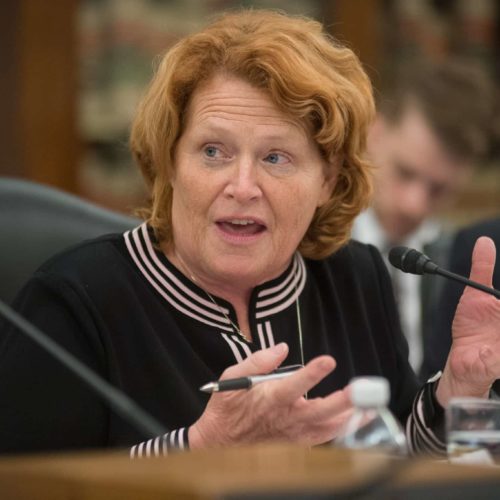Introduction
Former Health and Human Services Secretary Tom Price asked the Federal Election Commission for permission to transfer $1.7 million in leftover campaign funds to a new nonprofit “social welfare” group he’s starting, setting off a sharp debate at the Federal Election Commission this week over whether the move would be legal.
But Price may find comfort from an unlikely source: former Sen. Heidi Heitkamp, who just made such a transfer. Her lawyers point to a provision in the law they say allows it.
In April, Heitkamp, a North Dakota Democrat who lost her 2018 bid for re-election and started the year with nearly $6.5 million still stashed in her campaign account, transferred $750,000 to One Country Inc., a nonprofit social welfare group she helped found earlier this year.
Lawyers with the law firm Perkins Coie, which represents the Heitkamp campaign, said the transfer complies with a section of the law that allows contributions to be used for “any other lawful purpose” — a clause one FEC commissioner brought up during the debate over Price’s request.
The law does specifically prohibit using the money to personally benefit the candidate, something both Heitkamp’s and Price’s lawyers stressed would not happen.
“Neither Senator Heitkamp nor her family is being paid from One Country,” the lawyers said in a statement responding to questions from the Center for Public Integrity. “The terms of the transfer expressly prohibited the conversion of the funds to personal use.”
The statement didn’t address whether the Heitkamp campaign money might be used for political purposes.
Former congressional candidates can find themselves sitting on millions of leftover dollars, but they are legally circumscribed in spending it. The money can’t legally be used to personally benefit the former candidates. It can be spent on wind-down expenses, given — within limits — to other candidates and political committees, or transferred in unlimited amounts to political parties or charities.
Price, a former seven-term Republican congressman from Georgia, requested permission to transfer his leftover funds on the grounds that the group would be restricted in spending them.
His lawyer, Stefan Passantino, a former deputy White House counsel, told the FEC the transferred money would be kept in a segregated fund. He said it wouldn’t be used to pay Price or his family members, none of whom would draw salaries from the as-yet-unformed organization. He also said it wouldn’t be spent on political purposes.
It could be used to reimburse Price for expenses, Passantino said. That’s noteworthy because Price resigned as President Donald Trump’s health and human services secretary amid a scandal involving Price’s travel habits.
Passantino said creating a charity is a more difficult and expensive path than a “social welfare” nonprofit, which is why Price plans to create the latter.
Federal Election Commission Chairwoman Ellen Weintraub, a Democrat, said at an agency meeting Thursday that Price’s request is something the FEC hasn’t sanctioned before and “I’m not willing to do.”
Two Republican commissioners, Caroline Hunter and FEC Vice Chairman Matthew Petersen, disagreed and said the move would be legal. Independent Commissioner Steven Walther didn’t speak either way.
Because the normally six-member commission has two vacancies, any decision on Price’s request would have to be unanimous.
Weintraub didn’t respond to a request for comment on the Heitkamp transfer. Petersen said the money can be spent for any lawful purpose “provided the funds are not converted to personal use. When determining if an otherwise lawful donation was converted to personal use, what is relevant is how the funds were spent, not the tax status of the group receiving the donation.”
Hunter said of Heitkamp: “To the extent she’s doing what Tom Price wants to do, it’s absolutely permissible under the law.”
In 2013, former Rep. Allen West, a Florida Republican, transferred hundreds of thousands of dollars in leftover cash to a social welfare group named after him. There’s no record of the FEC taking any enforcement action in the case.
The way ex-lawmakers handle leftover campaign money has drawn increasing scrutiny from the FEC following reporting by the Tampa Bay Times and others about whether old campaign committees are functioning as “slush funds.”
Read more in Money and Democracy
Money and Democracy
They promise to help families of fallen officers. But they’re mostly paying telemarketers.
A union-backed police charity spends just a sliver of its money on those it purports to serve




Join the conversation
Show Comments